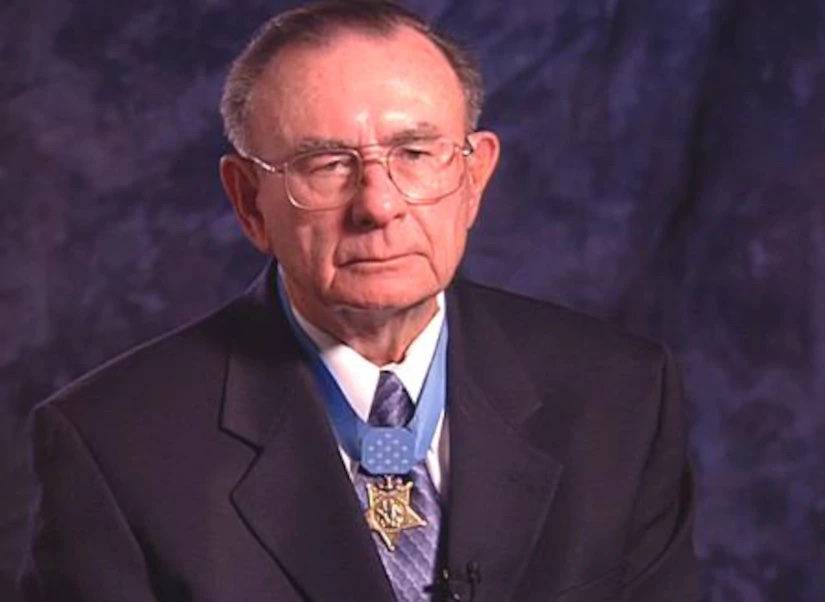On Friday the Navy announced that it would name a Lewis B. Puller-class expeditionary mobile base after Private 1st Class Robert E. Simanek, a Marine who 69 years ago threw himself onto a grenade to save his entrenched comrades in Korea.
Simanek absorbed the full blast — yet managed to survive.
“Somehow I managed to use the right part of my body that didn’t hurt me that much,” he later recalled of the wounds he sustained to his right hip and lower leg.
On the morning of August 17, 1952, the then-22-year-old infantry grunt serving with 2nd Battalion, 5th Marine Regiment, 1st Marine Division was selected to go on a morning patrol to an area just north of Seoul called Outpost Irene.
Despite being on patrol the night before and running on zero sleep, Simanek went. “I had been to the outpost before and thought of it as a somewhat vacation because no action had ever been there all the time I’d been on that particular part of the line,” Simanek told the Veterans History Project. “So, I took an old Readers’ Digest and a can of precious beer in my big back pocket and thought I was really going to have a relaxing situation. It didn’t turn out that way.”
While trudging uphill towards the outpost, mortar rounds and gunfire began exploding around the Marines who were walking single file along the path. The machine gunner directly behind Simanek was shot and killed, causing Simanek and five others to retreat back to the base of the hill for cover, according to the Department of Defense. Another Marine was shot through the chest yet miraculously still alive.
While taking cover in a four-foot-deep circular trench, Simanek managed to immediately take out two Chinese soldiers who were standing nearby. In retaliation, however, the enemy began hurling grenades in the direction of the Marines.

“To divert their fire,” according to the DoD, “Simanek popped up and again shot his gun, then dipped back into the trench and crawled about 10 yards away so the Chinese would fire into the wrong spot.”
The diversion worked briefly before two grenades found their mark. Simanek managed to kick one away, but didn’t think he had enough time to repeat the action as a second grenade came sailing in. Instead, he smothered it with his body.
“It was training, it wasn’t any mental decision on my part at all,” he recalled. “It was an automatic thing pushed by somebody.”
Despite his wounds, Simanek continued to fight — radioing in for a nearby tank to take out a bunker of Chinese soldiers slightly below them who were pinning down the Marines with lethal fire.
The tank managed to get through, briefly allowing two of Simanek’s comrades to carry the other injured Marine down the hill. However, another tank blast inadvertently struck the two men trying to bring Simanek to safety. While the two men were still mobile, they no longer could carry the wounded Simanek.
“The idea that they couldn’t carry me — it was no doubt the best thing to do for them to get going,” he said.
Despite suffering from severe nerve damage in his leg, Simanek began crawling on his hands and knees down the hill — eventually linking up with another squad who put him on an emergency transport helicopter.
First treated on the USS Haven in Japan, Simanek was then flown to Great Lakes, Illinois to recover. It would take him a year to recuperate, with the Marine being placed on the disability retired list on March 1, 1953.
Seven months later, the White House came calling. On October 27, 1953, President Dwight D. Eisenhower presented Simanek with the Medal of Honor.
After his discharge, the Detroit native graduated from Michigan State University, married, had a daughter, and worked in business before retiring in 1992. But for Simanek, like many others, the war did not leave him.
“One of the hardest things about the medal is that you’re really not allowed to forget about it,” he said. “People will, in a good meaningful way of trying to compliment you, bring about some memories that maybe you’d like to get rid of.”
This past Friday, Secretary of the Navy Kenneth J. Braithwaite once again honored the Marine stating, “Private Simanek stands in the unbroken line of heroes extending from the early Marines who once stood in the fighting tops of our original frigates, to the Marines holding the line around the world today, and those who will deploy from the future USS Robert Simanek for years to come.”
He continued, “This Expeditionary Sea Base continues the honored legacy of warriors from the sea, exemplified by her namesake.”





